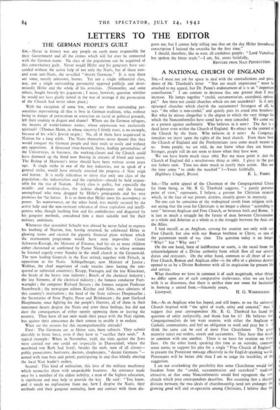THE GERMAN PEOPLE'S GUILT
LETTERS TO THE EDITOR
SIR,—Never in history was any people on earth more responsible for thcir Government and all the crimes which will for ever be connected with the German name. No class of the population can be acquitted of this contributory guilt. Never would Hitler and his gangsters have suc- ceeded without the active help of not only the Nazis, but of those non- and even anti-Nazis, the so-called " decent Germans." It is true there are some, mostly unknown, heroes. Yet not a single influential class, nay, not a single outstanding personality opposed publicly and deter- minedly Hitler and the whole of his atrocities. (Niemoeller, and some others, fought bravely his paganism ; I must, however, question whether he would not have gladly joined in the war of revenge if the persecution of the Church had never taken place.)
With the exception of some few, where are those outstanding per- sonalities representing all that is best in German tradition, who, without being in danger of persecution or ostracism on racial or political grounds, left their country in disgust and shame? Where are the German refugees, the bearers of world-famous names, whose oppression was exclusively spiritual? (Thomas Mann, in whose sincerity I firmly trust, is no example, because of his wife's Jewish origin.) No, all of them have acquiesced in Nazism for a long while. The Nazis themselves never dreamt that they would conquer the German people and their souls so easily and without any opposition. A thousand stout-hearted, brave, leading personalities of the Universities, in business, the working-classes and the Church could have dammed up the flood now flowing in streams of blood and terror. The Bishop of Muenster's letter should have been written seven years ago. A single strike in one of the key industries, not to speak of a general strike, would have entirely arrested the progress Nazi reign and horror. It is really ridiculous to stress that only one class of the population—the industrialists and the capitalists—should be held respon- sible for the rise of Nazism. Every class is guilty, but especially the middle- and working-class, the jealous shopkeepers and the former unemployed who were drugged by Hitler's propaganda and his rosy promises for the future. It is to them that Hitler owes his ascendancy to power. Its maintenance, on the other hand, was mainly secured by the active help and the non-resistant tolerance of those capitalists and intelli- gentsia who, though loathing him and his confederates and disgusted by his gangster methods, considered him a most suitable tool for their military ambitions.
Whenever that scoundrel Schacht was abroad he never failed to express his loathing of Nazism, but, having returned, he celebrated Hitler in glowing terms and created the gigantic financial plans without which the rearmament programme would have oeen impossible. Count Schwerin-Krosigk, the Minister of Finance, had his six or more children either christened or confirmed by Pastor Niemoeller, to whose sermons he listened eagerly every Sunday in the small church in the Grunewald. The now leading Generals in the East retired, together with Fritsch, in opposition to the. Nazis. Schlegelberger, now Minister of Justice ; Wohltat, the chief negotiator of trade treaties (now looting the con- quered or subjected countries); Krupp, Poensgen and the late Kloeckner, the heads of the heavy iron industry ; Bosch, of the chemical industry ; the late Siemens, of the electrical industry ; the famous conductor Furt- waengler ; the composer Richard Strauss ; the famous surgeon Professor Sauerbruch ; the newspaper editors Kircher and Silex, once admirers of this country's institutions ; the head of the State railways Dorpmueller ; the Secretaries of State Popitz, Posse and Brinkman ; the poet Gerhard Hauptmann, once fighting for the people's liberties, all of them in their innermost hearts despise the Nazis and utter these feelings, but did not dare the consequences of either openly opposing them or leaving the country. They have all not only made their peace with the Nazi regime, but against their conscience do their utmost to enable it to endure.
What are the reasons for this incomprehensible attitude?
First: The Germans are. as Shirer says, born subjects. They submit slavishly to brute force, even if they have to " sacrifice their souls." A typical example: When in November, 1938, the riots against the Jews were carried out one could see (especially in Duesseldorf, where the murdered von Rath had lived), besides the mob, men of all classes— public prosecutors, barristers, doctors, shopkeepers, " decent Germans "- armed with iron bars and petrol, participating in and thus blindly obeying the local Nazi leader's orders.
Second: This kind of militarism, this love of the military machinery which reconciles them with unspeakable baseness. An utterance made once by a member of the oldest nobility, a man of the highest education, is significant and may help to provide the key. He said: " You know, and it needs no explanation from me, ho'y I despise the Nazis, their methods and their gangster mentality, how any contact with them dis- gusts me, but I cannot help telling you that on the day Hitler introduced conscription I hoisted the swastika for the first time."
I should, therefore, like to warn all credulous people: " Lord Vansittart has spoken the bitter truth."—I am, Sir, yours faithfully,
REFUGEE FROM NAZI PERSECUTION.


























 Previous page
Previous page